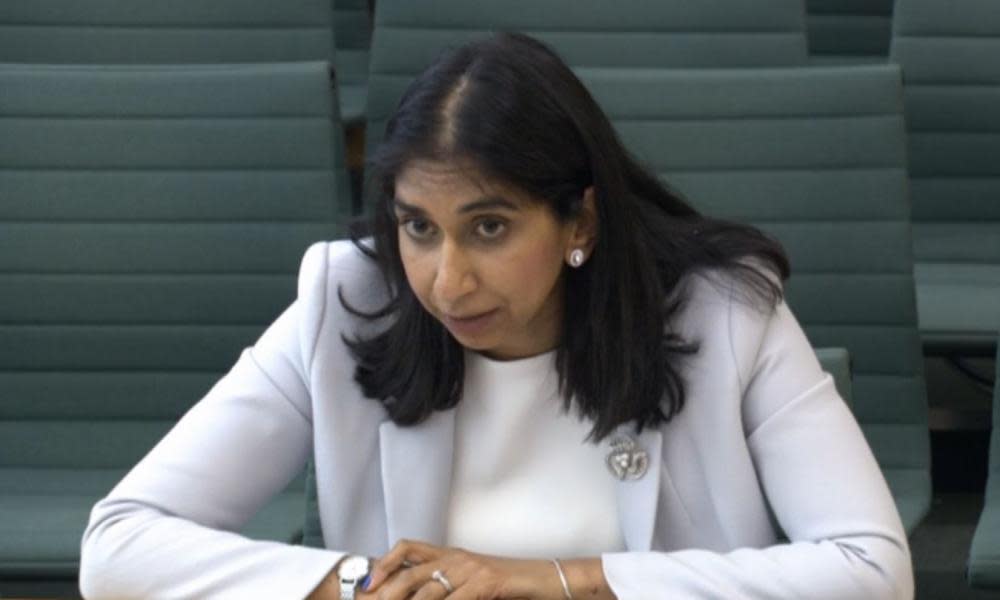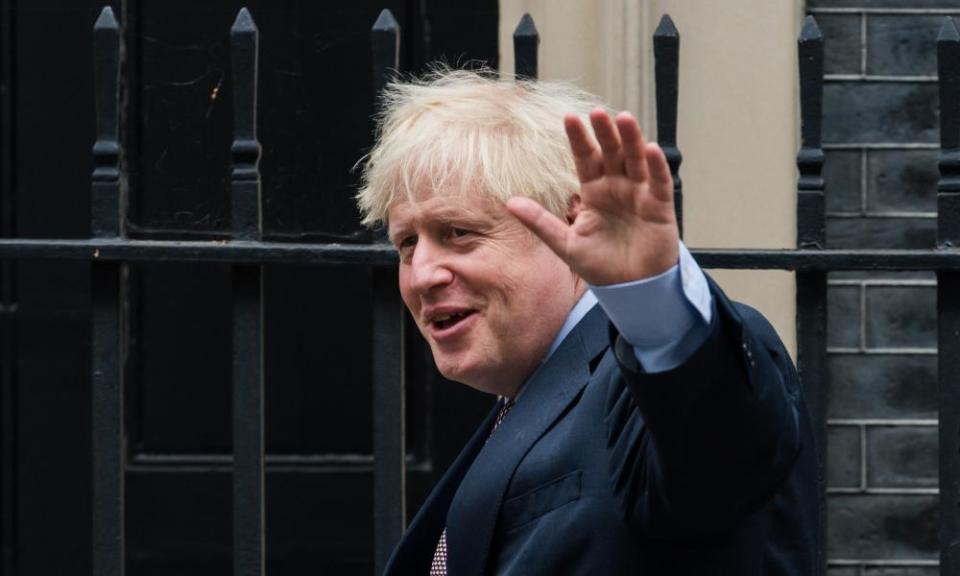Top lawyers slam Suella Braverman for wrecking UK’s reputation

The attorney general, Suella Braverman, was on Saturday accused of sacrificing the UK’s reputation, sidelining legal advisers and bypassing the ministerial code during an extraordinary confrontation with some of the country’s top lawyers.
During the annual general meeting of the Bar Council, the professional association for barristers, Braverman was asked how Britain could retain “a shred of credibility” in imploring other countries to follow international law after revealing its own willingness to breach agreements.
The criticisms came after the government last week unveiled plans to give ministers sweeping powers to “disapply” part of the Brexit deal that Boris Johnson signed in January.
Five QCs confronted the attorney general during Saturday’s meeting, telling her that a crime which broke the law in a “specific and limited way” – the phrase used by the Northern Ireland secretary, Brandon Lewis, when he announced the move – was still a crime.
The attacks came as Boris Johnson faced a growing rebellion over the explosive proposals in the internal market bill, with more senior Tories suggesting they could not support provisions that ministers admit breach international law. Former prime ministers Sir John Major and Tony Blair jointly condemned the Brexit legislation as imperilling the Irish peace process, trade negotiations and the UK’s integrity.
“It puts the Good Friday agreement at risk, because it negates the predictability, political stability and legal clarity that are integral to the delicate balance between the north and south of Ireland that is at the core of the peace process,” they wrote in the Sunday Times.
“This has wide-ranging ramifications. It will not only make negotiation with the EU more difficult, but also any trade negotiations with other nations, including the United States. Once trust is undermined, distrust becomes prevalent.”
They said that while they had opposed Brexit, they accepted it was happening, and this approach was “wrong in principle and dangerous in practice”.
Some critics are imploring Theresa May to take the lead in opposing the plans, to be debated in the Commons this week. One former minister said there was “exasperation” among Tories and that “the mood had changed”, even among some pro-Brexit new MPs.
Asked if she believed ministers were breaking the ministerial code with the legislation, Braverman on Saturday dodged the question by stating that the code was not legally enforceable. Pressed, she suggested the cabinet secretary had ruled that the code would not be breached.
She was also confronted over why she had sought advice on the measures from three pro-Brexit legal figures, including one junior barrister who had worked with the Vote Leave campaign, rather than relying on senior government lawyers. She refused to disclose the advice she had received, but said that seeking external opinions was not unusual.

Braverman was asked what had changed since former justice minister Lord Faulks stated in 2015 that ministers would not breach international law. She said his statement reflected “government policy at the time”.
The proposals were needed to resolve tensions between domestic and international law created by the EU withdrawal agreement, she said, but the government remained “committed to the rule of law”.
The new measures are designed to ensure that in the event of a no-deal outcome, no checks are needed when goods travel from Northern Ireland to Great Britain, and that the UK can set its own state aid rules. However, they breach the EU withdrawal agreement. The EU has made clear that there can be no future trade deal should the UK press on with the measures. Olaf Scholz, the German finance minister, said on Saturday that a no-deal Brexit would hurt the British economy far more than the EU. “Europe would be able to deal with it and there would be no particularly serious consequences after the preparations we have already made,” he said.
Tory concerns were mounting over the new legislation this weekend. A significant rebellion would be needed to overturn the government’s 80-strong majority, but potential rebels are hoping that May will lead the charge. She is said to be away from the Commons for the first vote on the plans on Monday, when many Tory MPs are likely to at least withhold their support. However, key votes could yet happen next week.
Former cabinet minister Andrew Mitchell said: “The EU is behaving extremely badly in these negotiations. It is quite extraordinary that they appeared willing to offer Theresa May a Canada-style deal which they are now not prepared to offer Boris Johnson. However, while the [internal market] bill overall is important and right, I think it will be extremely difficult to vote for provisions which quite specifically seek to breach international law.”
Tobias Ellwood, the Tory chair of the defence select committee, also said he could not vote for the measures unamended. “Already this bill is damaging brand UK, diminishing our role-model status as defender of global standards. As we go to the wire, let’s see more British statecraft – less Nixonian madman theory,” he tweeted.
Senior MPs said they still believed a serious rebellion could break out in the Commons if provisions in the internal market bill were rejected by the House of Lords. One leading backbencher said there could be early support for an amendment to give parliament a veto, tabled by the Tory chair of the justice select committee, Sir Bob Neill: “I think there will be some votes against at second reading but some will also abstain. Others may vote for a second reading then reconsider and vote for amendments later if ministers do not back off. If the Lords reject it and the government does not give way, I think it could lose in the Commons on this very important issue.”
In an Opinium poll for the Observer on Sunday, 46% of all voters say it is “unacceptable” for the government to break international law, against 33% who say it’s acceptable. Among people who voted remain in 2016, 67% say it is unacceptable and 21% acceptable. Among leavers, fewer than half (45%) think it is acceptable while 31% believe it unacceptable.
The poll puts the Tories on 42% (up two on a fortnight ago) with a three-point lead over Labour on 39% (down one), and shows 52% now believe the UK will leave the EU without a deal; 50% believe this would be bad for the economy.

 Yahoo News
Yahoo News 
